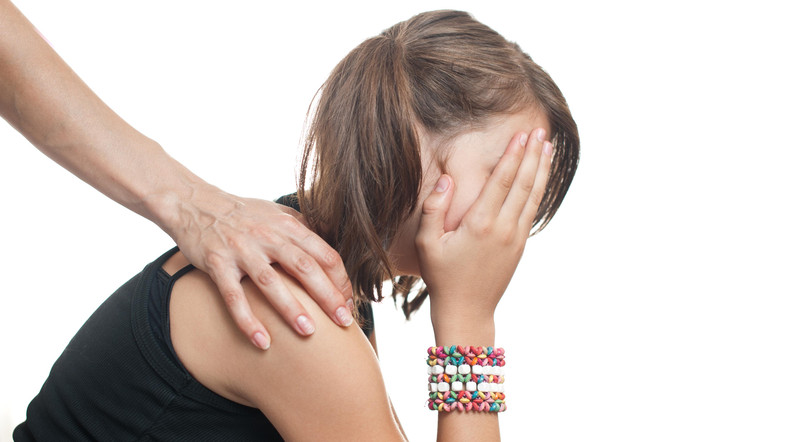How a viral Facebook challenge could be harming our children

Al Arabiya
Tall and gangly with bright ginger hair, thick glasses and gappy teeth – I guess I’d have been called a nerd if I were a child now.
Funnily enough, I don’t remember being teased for the way I looked back in the eighties though.
While my friends may poke fun at old pictures of me now, I often wonder if it was the people around me who shielded me from spiteful comments that may have come my way back then.
My mother always told me I was beautiful. Red hair aside (she couldn’t help but gush about how amazing that was), she never really mentioned physical attributes. But I remember getting older and her telling me how many years earlier her friend’s mother remarked that maybe I’d “grow up to be a swan,” obviously meaning I was a pretty frightful looking baby.
It had upset my mum. Not so much the insinuation that her child was ugly, more the realisation that her innocent baby was growing up in a world where her physical appearance would be under intense scrutiny.
I may cringe when I look at old pictures of myself but I didn’t care how I looked back then.
I would play outside without first checking that my ginger eyebrows were shaded with brown pencil and if a picture was taken I would give a wide missing-tooth grin and not worry that my head wasn’t tilted at the perfect angle to make my face look slim. And what an amazing time it was.
It’s something I’ve been thinking about recently after seeing a challenge on Facebook where people are asked to post two pictures of themselves – a childhood photo next to an adult snap.
These transformations, described as ‘glow ups’ have been given the tagline “be careful who you call ugly’ – obviously highlighting that the picture of themselves as bespectacled, frizzy-haired youngsters are “ugly.”
Now, I don’t know if I’m being over the top here but it really jars with me.
For one, if they were bullied for the way they looked and have transformed themselves into something completely different, it’s kind of a victory for the bully isn’t it? And two, which is far more distressing to me, you’re implying that wearing make-up, losing weight and straightening your hair makes you pretty.
I get it, for many of us wearing make-up and staying slim gives us confidence. It’s sad but true. But there are young, impressionable girls – and boys - who haven’t fallen into that trap yet. Who aren’t worried that their hair isn’t straight or their faces aren’t contoured.
And shouldn’t they be celebrated and protected?
As a mother of a child who has inherited my red hair and pale skin it worries me that she’ll stumble on this “be careful who you call ugly” craze and suddenly start considering herself as just that.
It’s something Wellbeing Coach Susan Fitzgerald believes reveals a lot about the mind of the person posting the picture.
While I may worry about the impact such trends could have on young girls, Susan, a former fitness manager at Dubai’s Burj Al Arab Hotel, says the girls uploading the pictures could still be struggling with feelings from their own childhoods.
She says: “If taking pictures offers these girls closure and they are loving their bodies for themselves and not to prove anything to anyone, that’s OK. But to have to put things like that on social media kind of signals to me that they are still holding on to the hurt of being bullied and they need to realise that nobody deserves to be bullied whether or not they have changed their appearance.”
And while the girls posting these images are hoping to silence critics of the past, they could simply be rousing new judgement.
Paediatric nurse and mum to two-year-old Mia, Clair Armitt describes the craze as “attention seeking” adding: “It’s mean as these people are portraying how they used to look in a negative light and confirming the idea that if you don’t look cute in the way that modern society suggests then it’s a bad thing.”
Rather than posting pictures on social media, Susan says there are far healthier ways to deal with demons from the past.
She says: “Write a letter to the person who bullied you and say that you release them and no longer hold on to the pain they caused. Tell them you can see that they were in fact in more pain and you are grateful to them as you’re now stronger because of the negative experience. Don’t post the letter – just use the experience of writing it to release old demons.
“Also, whenever you think of anything negative that was said to you as a child, counteract it by imagining yourself standing strong and saying positive things about yourself.”
Hopefully the children at risk of having their confidence torn apart by something posted on the Internet will be too busy riding bikes and having water fights to worry about what the paranoid adults around them are up to online anyway.
Latest News
-
 Jordan, Arab, Islamic countries reject Israel’s recognition of Somaliland
Jordan, Arab, Islamic countries reject Israel’s recognition of Somaliland
-
 Trump Says Had 'Productive' Call with Putin Ahead of Zelensky Meeting
Trump Says Had 'Productive' Call with Putin Ahead of Zelensky Meeting
-
 Netanyahu to Meet Trump in US on Monday for Talks on Iran, Gaza, Hezbollah, Syria
Netanyahu to Meet Trump in US on Monday for Talks on Iran, Gaza, Hezbollah, Syria
-
 JMD forecasts heavy rain, brisk winds, low visibility
JMD forecasts heavy rain, brisk winds, low visibility
-
 Prince Hassan congratulates Christians on Christmas
Prince Hassan congratulates Christians on Christmas